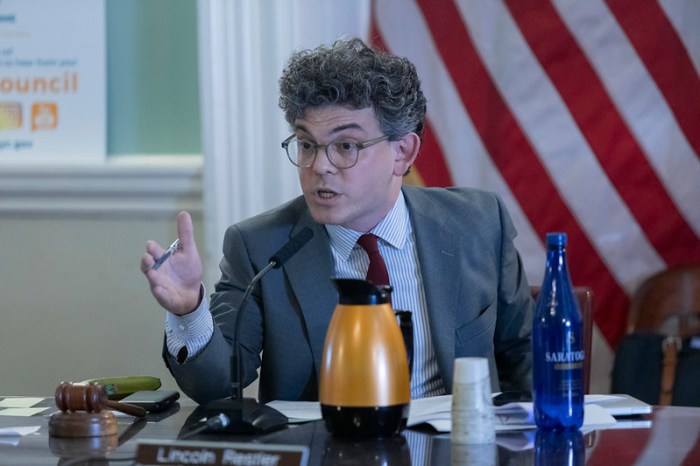Federal Judge Recommends Denial Of Trustees’ Lawsuit
Six ousted members of the Queens Borough Public Library (QBPL) board of trustees have no legal grounds to sue Queens Borough President Melinda Katz for removing them last month, according to a legal response on her behalf in the members’ federal lawsuit.
U.S. Magistrate Judge James Orenstein seemed to agree with that assessment on Tuesday, Aug. 12, as he recommended denial of the trustees’ request for an injunction blocking their removal and a temporary restraining order restoring them to the panel.
As previously reported, the six trustees-Jacqueline Arrington, Joseph Ficalora, William Jefferson, Grace Lawrence, Terri Mangino and George Stamatiades-sued Katz, Attorney General Eric Schneiderman and New York State in federal court earlier this month, charging their removal violated the U.S. Constitution.
The restraining order request was to have been considered at a federal court hearing in Brooklyn on Monday, Aug. 11, but it was postponed after Judge Roslynn Mauskopf-the presiding jurist assigned to the matter-recused herself due to a long-standing and close relationship with a lawyer representing the library board in its investigation of a whistleblower complaint.
“The results of the internal investigation are central to the contract claim and the First Amendment claims,” Mauskopf said, as noted in a court transcript provided to the Times Newsweekly. “The internal investigation appears to be central to the fact development in this case.”
After Orenstein’s denial the next day, the attorney representing the six trustees gave no indication of whether litigation would continue. U.S. District Judge Margo Brody is expected to render an official decision, and the plaintiffs have until Aug. 29 to file objections and potentially appeal the ruling.
“The six trustees are distinguished leaders with long records of service to the community. They could not allow the actions by the borough president to go unchallenged,” said attorney Doug Grover. “They brought this action to assert the independence of the library and the right of every trustee to act without political interference. They are understandably disappointed by today’s outcome but remain true friends of the library and hope for its continued success.”
Can’t rely on Contract Clause
Each of the six were previously appointed by former Queens Borough President Helen Marshall and rebuffed calls Katz and other lawmakers made to reform Queens Library in the wake of scandals surrounding its president and CEO, Thomas Galante.
In an 11-page memorandum filed last Monday, Aug. 4, in U.S. District Court in Brooklyn, City Corporation Counsel Zachary Carter argued the trustees’ lawsuit against Katz was flawed, charging the borough president had cause and authority under recently-passed state legislation to take such action.
Carter charged the six trustees’ lawsuit is primarily based on the federal Contract Clause, but such an argument was rendered inadequate due to a previous federal court ruling upholding a state’s power “to amend or repeal corporate charters.” The state legislature first approved QBPL’s act of corporation in 1907 and amended it multiple times in the years that followed.
The counsel pointed out no objects were filed against any previous amendments to QBPL’s act of corporation that the state legislature and governor approved.
“The recent amendment imposed no new duty upon the trustees concerning the furtherance of the library’s educational purposes, but only afforded the borough president and the mayor the power to respond to a breach of that existing duty,” Carter stated. “Previously, the power to remove a trustee had been assigned to the board of trustees by the QBPL’s by-laws.”
Not an unconstitutional decision
Carter further dismissed the trustees’ claim that their removal violated their First Amendment right to free speech, arguing their support of Galante and refusal to fully disclose the library’s finances to City Comptroller Scott Stringer were valid reasons.
“Voting to retain the current president of the QBPL, Thomas Galante, in the midst of the scandals he has brought upon the library and voting to resist the comptroller’s legitimate inquiries into the financial transactions that underlie those scandals is not protected speech,” he wrote. “The legislature expressly adopted these amendments to empower the borough president and the mayor to address the recent scandals at the QBPL-not to immunize the trustees-and it would violate the clear legislative intention to preclude the borough president from removing a trustee for taking actions that the legislature amended the statute to address.”
Galante came under fire earlier this year amid published reports that he received a nearly $400,000 annual salary from Queens Library and authorized a six-figure renovation of his Jamaica office, which included the construction of an outdoor deck. Questions also arose over the library’s authorization of private contractors to perform certain services.
Say trustees made poor choices
After stories about the library’s finances broke, Carter noted, Katz repeatedly reached out to the board of trustees seeking further information about Galante’s salary and whether city funds were used to fund the office renovation.
In two conference calls with the borough president, Carter stated, none of the trustees “could answer with certainty as to whether the board ever voted on the construction of an outdoor deck or whether city money was used to build it.” Additionally, Galante repeatedly ignored requests Katz made to provide for further financial information.
The scandal led Comptroller Stringer, the FBI and the city Department of Investigation to launch separate inquiries into Queens Library and Galante. Additionally, Carter noted, U.S. Attorney for the Eastern District of New York Loretta Lynch convened a grand jury which subpoenaed Galante and Queens Library for various documents.
Even so, the board of trustees deadlocked in April on a resolution that would have forced Galante into a leave of absence pending the ongoing investigations. Five of the six members Katz removed voted against the resolution; Arrington abstained from voting.
Then in May, the trustees further angered Katz and other lawmakers in passing a resolution authorizing Queens Library to release to Stringer financial documents in accordance with a 1997 disclosure agreement reached with then-Comptroller Alan Hevesi. Stringer, seeking full financial disclosure from the library, filed a lawsuit seeking that the courts declare the agreement invalid.
All six members that Katz removed voted in favor of the May resolution.
Response ‘was not sufficient’
Katz removed the six last month and subsequently denied their appeals. In a form letter to each of them, the borough president stated the state legislature provided her and the mayor “with appointment, and now removal, authority to create accountability for the provision of library services and to protect library assets and public dollars.”
“I have questioned why the board isn’t taking all possible steps to get a firm grasp on current library finances and why the board isn’t providing full cooperation with an audit by the governmental entity empowered to do so,” Katz wrote. “Your response is not sufficient. … Clearly, several other trustees felt it was important to cooperate with the comptroller, but you voted against that step toward accountability and true understanding of how CEO Tom Galante manages taxpayer money.”
“Such an action does not protect library assets and therefore doesn’t further the educational purpose of QBPL,” she added.
































